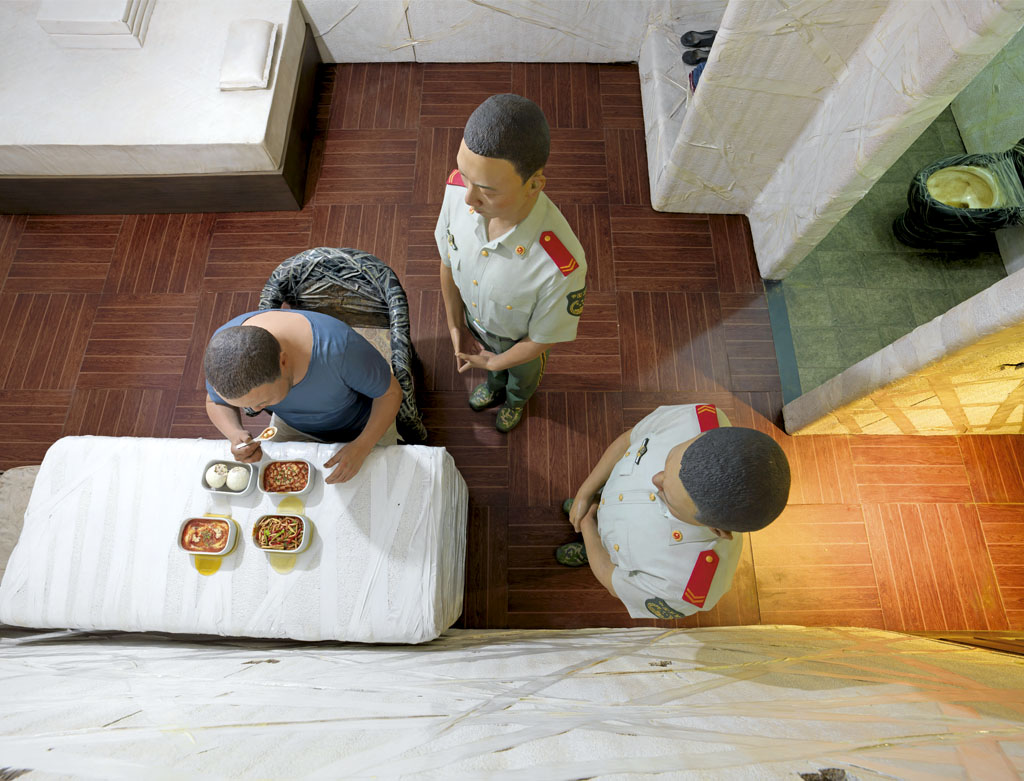13-05-24 // BEAUTY CAN STILL BE FOUND – INTERVIEW WITH AI WEIWEI

View inside of one of the six iron boxes of the S.A.C.R.E.D. installation during “Supper”
Image is courtesy of Ai Weiwei Studio, ©Ai Weiwei Studio
Bernd Upmeyer interviewed Ai Weiwei, who is a Chinese conceptual artist, documentarian, and activist. Many of his works are especially conflict-driven and strongly related to architectural, urban, and spatial topics, which we at MONU considered as particularly interesting to talk about in this issue on “Conflict-driven Urbanism”. Several of these projects were recently exhibited in the Kunsthal in Rotterdam under the title “In Search of Humanity”. The interview took place in May 2024.
Life-shaping Conflicts
Bernd Upmeyer: With this new issue of MONU on “Conflict-driven Urbanism” we aim to investigate how conflicts shape and influence cities and buildings, and spaces in general, whether these conflicts are armed or unarmed conflicts. In an interview with The Guardian in 2021 you stated that the year you were born, your father, Ai Qing, a poet, was exiled being accused of “rightism”. Your family was subsequently exiled to Shihezi, Xinjiang, and only returned to Beijing in 1976 after Mao’s death. One might say that you were born right into conflicts. How did these early conflicts shape your life?
Ai Weiwei: The conflicts that I was born into arose from the cultural cleansing of diverse opinions and dissenting thoughts within a highly autocratic society. These conflicts in early-stage communist countries manifested themselves in a brutal and cruel manner. My father, a poet and politically exiled individual, was labelled anti-party and anti-socialism. This branded us as dissenting individuals in terms of class; the quality of our existence, all actions and thoughts, were subjected to strict censorship and surveillance, often triggering significant criticism. Yet, for me, this had a positive effect; it positioned me invariably on the opposite side of mainstream culture. I was acutely aware of our difference from mainstream culture, and even if conformity was desired, it was not permitted. Consequently, I naturally became a rebel. I believe this has profoundly impacted my future work, fostering a suspicion of mainstream ideologies and an innate disdain for the masses and crowds and grandiose political ideals.
BU: In the same interview you describe the bleakest period of this early exile as the period when you, your brother, and your father lived in a dugout in “Little Siberia”, part of China’s far north-west. You mention that there your “bed” was a raised dirt platform covered with wheat stalks, with a square hole in the roof to let in light. How was it growing up in such a place?
AW: We lived in an underground dugout, known as a “diwozi.” It featured a small window in the roof, through which a ray of light entered. This small detail was profoundly informative. The walls of our dugout were very thick, matching the depth of the earth itself. That single ray of light became particularly captivating because, without it, we would have been enveloped in complete darkness. In such dire circumstances, I learned that beauty can still be found; it is inherently linked to the quality of our existence. This experience brought me a profound awareness…
… the complete interview was published in MONU #37 on the topic of “Conflict-driven Urbanism” on October 14, 2024.
Title: Beauty Can Still Be Found
Project: Interview with Ai Weiwei
Date: May 2024
Type: Commissioned interview
Topic: Conflict-driven Urbanism
Organizer: MONU
Status: Published
Publications: MONU #37, P. 105-112
Interviewer: Bernd Upmeyer